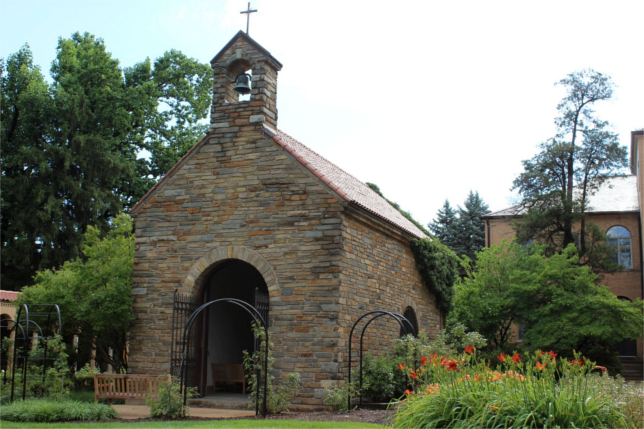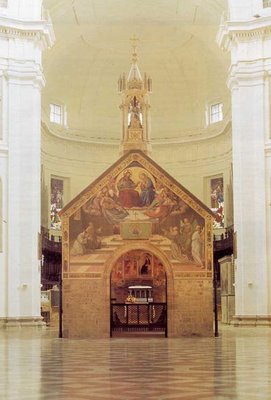God was so pleased with His Masterpiece of creation, Mary, that He willed to be born of her pure flesh and blood. By giving her consent, Mary became the channel through which Christ came to men; and this channel is the surest way to lead us back to God. It was Mary’s love for man, joined with and flowing from her love of God, that made her utter her “Fiat” – that Fiat meant consent to the Incarnation and to the Redemption. So also the Salvation of the world depends on Mary.
Our consecration, then, must be more than a well-written prayer, recited and then forgotten; it must be a vital, living state in which we recognize the importance of habitually belonging to Our Lady; to be fruitful it must inspire imitation. We must try to reshape our lives according to Our Lady’s, setting up a whole new pattern, studied at her feet, learned from the Rosary mysteries and modeled after her own Immaculate Heart.
To consecrate means to remove from the profane and set apart as sacred; renouncing self-love; doing all in union with and for our Heavenly Queen; removing sin and all obstacles to perfect union of heart with hers. If we do this, Mary will teach us all virtue and the way that will lead us to God. If men become slaves to an art which ends with death, should we not become slaves of Mary, the music of whose Heart will sing out for all Eternity?
 Love will prompt this total submission, solid love of the will, ending in
imitation and surrender. Our love for Mary must be so
Love will prompt this total submission, solid love of the will, ending in
imitation and surrender. Our love for Mary must be sointense that we chain our hearts to hers by golden links of love, stronger than any base metal of earth; Mary will then govern our thoughts, words, deeds. Our life will have but one purpose – God’s glory. Our hearts will yearn only for her interests and her honor – which is God’s honor, too; all her intentions and dispositions will become ours. Her humility will replace our pride; her purity efface our impurity; her selflessness, wipe out our self-love; and all her virtues replace our sins. From her we will learn the meaning of prayer, mortification, and penance. Resting close to her Immaculate Heart, our own cold hears will become enkindled with the Divine Fire and grow ablaze with her burning love.
Our lives thus surrendered to her can become like that of the angels, one continual song of praise; our hearts annihilated and lost within the sanctuary of her Immaculate Heart, will be able to sing truly, “My soul magnifies the Lord and my spirit rejoices in God my Savior.”
The Feast of the Immaculate Heart of Mary
Memorial of the Queenship of Mary

Dr. Edward Sri brings out the subtle scriptural allusion to Mary as Queen in Matthew 2:11:
“All throughout the narrative in Matthew 1–2, Joseph is much more prominent than Mary. Matthew traces Jesus’ genealogy through Joseph. The angel appears to Joseph three times. It is Joseph who leads the Holy Family to Bethlehem, to Egypt, and back to Israel. From this we can see Joseph often takes the spotlight in the first few scenes of Matthew’s Gospel. However, in this particular episode when the Magi come to honor Jesus, Mary takes center stage and Joseph fades into the background. Why? Because it shows the importance of Mary as queen mother.”*
All who call her Queen and Lady express the consent of faith to this teaching. And, Pope Pius XII wrote that:
“…it is easily concluded that she is a Queen, since she bore a son who, at the very moment of His conception, because of the hypostatic union of the human nature with the Word, was also as man King and Lord of all things. So with complete justice St. John Damascene could write: ‘When she became Mother of the Creator, she truly became Queen of every creature.'”The Blessed Virgin Mary has been celebrated and honored as Queen from the earliest history of the Church. Every honor and devotion we give to her “redounds to the glory of her Divine Son, not only because all graces and all gifts, even the highest, flow from Him as from their primary source, but also because ‘The glory of children [is their parentage]’ (Book of Proverbs, 17:6)” (Fulgens Corona — Radiant Crown).
It is interesting to reflect on Mary’s title “Mother of Mercy” (or “Queen of Mercy”). We hear her called that in various Church prayers. Although she has the title “Mirror of Justice” which we address her by in the Litany of Loreto, St. Alphonsus Liguori, in his famous treatise The Glories of Mary, points out that she is never called the Mother of Justice. “Mary, then, is Queen,” he writes, “but let all learn for their consolation that she is a mild and merciful Queen, desiring the good of all sinners… Kings… should principally occupy themselves with works of mercy, but they should not neglect the exercise of justice toward the guilty when it is required. But Mary is not a queen of justice, intent on the punishment of the guilty, but rather a Queen of Mercy, intent only on compassion and pardon for sinners. Accordingly, the Church calls her Queen of Mercy.” So, let us invoke our Blessed Mother this day, frequently, just as is done in the beautiful prayer said at the end of the rosary, and sung often after Compline, or Night Prayer, in the Liturgy of the Hours, “Hail, Holy Queen.” “Salve Regina!”
PLEASE ... PRAY FERVENTLY THAT OUR LADY'S IMMACULATE HEART TRIUMPHS SOON & THAT ALL BE SAVED & NONE BE LOST ACCORDING TO GOD'S HOLY WILL!
Additonally, Pope Leo requests that 8.22.25 be a day of prayer & fasting for PEACE.






